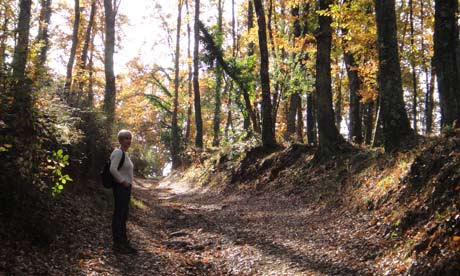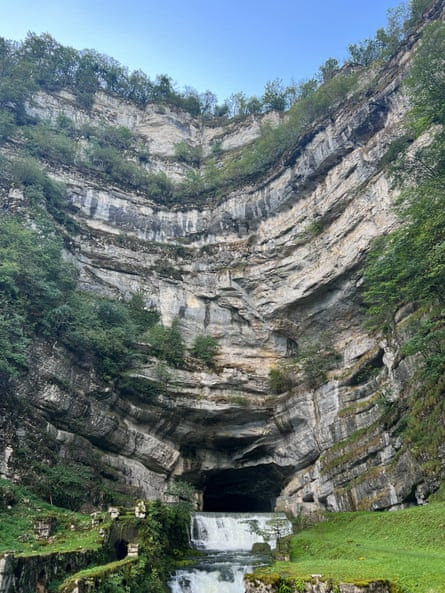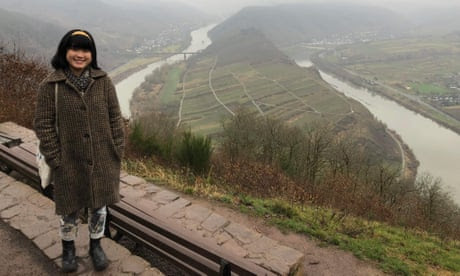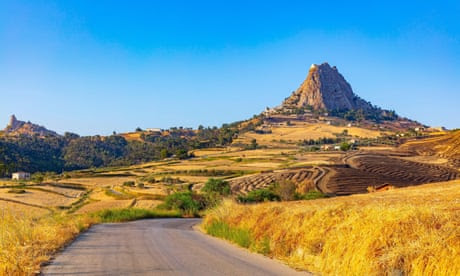I take risks on solo hikes, navigating animal traps and dangerous terrain. But for a woman, men are the biggest threat. I do it to be more open to the world, in the hope it will be more open to me
The path, more of a faint depression in the field I had just crossed, disappeared into a wood: yes, I could see an opening in the vegetation. The day before, I had left the official walking route of the Via Francigena, an ancient pilgrimate route from Canterbury to Rome, to stay at a B&B that was highly rated and affordable. Early next morning, after stuffing my pockets with the breakfast my hostess had set out for me, I cracked open the massive gate in the wall surrounding the little country compound and sneaked through.
The village was quiet. Not even roosters were up as I found my stride on a dirt path that would, according to Google, take me back to the route. All I had to do was follow the track that cut south through a forest that showed on the map as a fairly small green blob between me and my destination. No problem.
Except that Google and I were a little lost. Or, more accurately, the signal was sketchy, and I was not 100% sure this was the right way.

I stepped between the trees into a Little Red Riding Hood gloom and hummed a nonsense song. I am more than capable of freaking myself out. A sign nailed to a tree gave me hope. All sorts of labelled and well-maintained paths run through the patches of forest that dot the rolling, mostly agricultural French landscape I’d been walking through for the past week. This sign was not a label, however. Beware, it warned, but I couldn’t make out the other words. Wolves? Wild pigs? I managed to catch a blink of signal and Google Translate informed me that I should watch out for traps.
OK, I thought, as long as I stay on the path. Which, of course, petered out after a few hundred metres. I could backtrack, return to the village and take the long way around, which would add several hours to a day I already expected to be long, or I could forge ahead, using flashes of sun for bearings. I heard my husband’s voice in my head, something about the sunk cost fallacy.
I picked up a fairly long and sturdy stick and, stirring the ground cover ahead of me, stepped carefully through the low tangle of brush, keeping the sun, what I could make of it, to my left. I banished all thoughts of steel traps, shredded ankle tendons and long hospital stays. But a moment of panic sucked the breath from my chest. If I did step on a trap, there would be no way to call for help. After some time, the trees thinned, more sunlight reached the forest floor, which I continued to probe, and then I was literally out of the woods. I laid my stick aside and pulled out one of Madame’s breakfast croissants, which was slightly crushed but delicious, with its layers of butter and relief.
As a woman and a mother, it is rare to only have to consider what I want and need without having to first attend to so many other people
Had I been scared? I’d definitely felt the prick of heightened alertness. In hindsight, taking the shortcut might have been marginally or royally stupid. Certainly, it was a challenge, but one I felt up to, and while it may be unclear how much luck played a part, I did manage to come out in one piece. Mostly, I think, I was too busy paying attention to be afraid.
When I walk alone, the consequences of every good or bad choice I make fall entirely on me: a responsibility and a freedom. As a woman and a mother, I rarely only have to consider what I want and need without having to first attend to other people. I know there are risks, but each time I come out of that “forest”, I feel stronger and more confident. Weighed against the simple daily rhythms of a long-distance walk and the joy and wonder I experience, risk – reasonable risk – becomes a small part of the equation, and one I am willing to accept.
Many things frightened me as I made my way from the Channel through France, over the Alps in Switzerland, and across northern Italy to Rome. Some were rational fears – aggressive dogs (only two, called off by owners), a cash machine eating my card (didn’t happen), getting lost (an occasional, correctable problem); some weren’t.

‘Out of a cave big enough to fit a truck came a muscular torrent’ … the source of the Loue near Mouthier-Haute-Pierre in France. Photograph: Lea Page
One rainy morning, I crossed a bridge, leaving behind the tiny town of Mouthier-Haute-Pierre, close to the Swiss border. I followed the trail up and up. To my left, the Loue river tumbled and thrashed. To my right, cliffs. There was no quick way out of that gorge, and I felt a sudden clench in my chest, the grip of claustrophobia. I took some deep breaths, kept my feet moving at a steady pace, a counterpoint to my beating heart, and looked around – really looked. The trail was soft with pine litter, the rain had stopped and the clouds, what I could make of them through shifting boughs, had parted enough for a few shafts of sunshine to highlight the mist rising from the warming ground. I turned my face toward the sun and kept going.
The trail and I eventually arrived at a semicircular rock wall, at least 100 metres high, and out of a cave big enough to fit a truck came a muscular torrent, the Loue, fully formed. I gaped for several moments, speechless. I had imagined the source would be a trickle of water oozing out of soft earth. Then I noticed signs warning of floods and saw the iron safety rails sunk into the rock … Maybe my fears weren’t so misplaced, after all. I decided it was time to move on.
That’s what women are really talking about when we talk about being afraid. We are talking about men
One other time, while walking along a river just outside Colle di Val D’Elsa in Tuscany, I felt that familiar clench of panic. This river, a glacial robin’s-egg blue, meandered and tumbled gently. The gorge was not deep, but a lonely wooded path just outside a city struck me as the perfect place for an ambush. Clearly, men exist everywhere, so it made no sense to be frightened in that one particular place. I knew that, statistically, women are safer out in the world than they are at home, but in that moment, knowledge felt like thin protection. Unable to shake my feelings of dread, I called my husband, and we talked about inconsequential things so I could hear his sleepy voice and keep putting one foot in front of another.
And that’s what women are really talking about when we talk about being afraid. We are talking about men. But there is, I learned, a difference between being afraid and being unsafe.
As I set out each morning in France, first along canals, then through the vineyards of the Champagne region and finally into the hills and gorges of the Jura Mountains, I frequently ran into groups of older men, who had gathered early to walk dogs and pick up baguettes at the village bakery. After dispensing with the basic who, where, why information, the men invariably moved on to the real topic of interest, the state of American politics. They made no end of jokes about us hapless Americans, their good-natured ribbing an unexpected yet welcome way to begin the day.
I had one unnerving night in France at a hotel where a group of people, drunk, I assumed, kept trying their key in my door. I made sure the lock was secure and slept fitfully.

From Switzerland to Italy … the trail from Bourg-St-Pierre to the Great St Bernard Pass in the Swiss Alps. Photograph: Lea Page
I continued to use my French as I walked along the terraced shores of Lac Léman (Lake Geneva) in Switzerland and then over the Great St Bernard Pass into Italy. My Italian – much better than my French – and my hand gestures came in handy when I had made it down from the mountains and was walking through the flat rice fields of the Po valley. It was hunting season by then, and I had seen men out with their rifles. I had brought a blaze-orange cap in anticipation, but I still felt exposed on the long dirt roads.
The men lifted their hands as if they were holding their weapons and made “bang, bang” noises and gestures
Before dawn one morning, I passed a cafe that was packed to the gills. Italians hadn’t struck me as early risers, so I was curious until I noticed they were all in camouflage. I felt, all of sudden, all of their eyes on me – the sole moving object, the sole woman. A second ticked by, and another. Then I pointed to my hat, pointed to the road ahead, and said in Italian, with a wry grin, that I was heading in that direction – meaning, please don’t shoot me out there. Immediately, the men lifted their hands as if they were holding their weapons and made “bang, bang” noises and gestures. And they laughed and laughed. I laughed, too, and waved, and they waved back. It was all fine. I was safe.
The night before I crossed the Po, I was the only one staying in the hostel in the village of Corte Sant’Andrea, which also had a restaurant, a church and a handful of homes. I showered, made myself dinner from the supplies left in the fridge for us pilgrims, and turned in early. As I lay on my cot, I started to feel the emptiness of the hostel close in around me. And then I heard a knock – no, a pounding – on the front door, which I had locked as directed by the young woman who had let me in that afternoon.

A 19th-century aqueduct outside Lucca in Italy. Photograph: Lea Page
I threw on trousers and went down the stairs. I heard a woman’s voice, so I opened the door. Later, I would think of it as a visitation from the seven dwarves, or fairies, or maybe angels. It was, in fact, a crowd of Italians who wanted to come in, ostensibly to drop off a bottle of olive oil in the kitchen, but it doesn’t take seven people and a priest to do that. Hilarity ensued. Zia – auntie – as she introduced herself, gave me a detailed tour of the fridge, pulling out each item, checking expiry dates on cheese – “a few days past on this one, but still good”, she said in Italian. I understood only every 10th word, but the hugs needed no translation.

I left the Po valley near Fidenza and began my climb into the Apennine Mountains, which run like a spine down the length of Italy. On a long day with more than 1,000 metres of ascent, two young men stopped their car and wanted to know all the usual information. They were cheerful and funny, and eventually offered me a ride. I had hours of climbing ahead of me, and my instinct told me they had good intentions. I declined their offer anyway. I was there to walk, for one, and also, even though I had learned to trust my instincts around men, common sense told me to never get in a car with them.
Descending from the Cisa Pass into Pontremoli, in northern Tuscany, I passed a group of men huddled outside a closed cafe. I immediately recognised the looks in their eyes and lengthened my stride, ignoring their catcalls. Not fun, but nothing I hadn’t experienced at home.
A few days later, as I made my way south, a cyclist stopped to talk. I told him, as I always did, that I was eating well. Italians always wanted to know if I was eating enough, if I was eating the right things. It was like being mothered by a whole country. I told the cyclist that Italy was bella. “Si,” he said. “Bella e brutta.” Beautiful and ugly. We agreed that this is the world – you can’t have the one without the other.

I saw both on this trip, but mostly beauty, so much beauty.
My long walk was challenging – and delightful – in so many ways, in so many unexpected ways, and I felt more alive because of those challenges and delights, more attuned to the present moment. I increased my odds of staying safe by using my common sense and by paying attention. That is, in fact, the reason I go on a long walk: to pay better attention, to be more in the present moment, to take the risk that, by being more open to the world, it will, in turn, be more open to me.
The caption on the image of the aqueduct outside Lucca was amended on 8 September 2023. The aqueduct dates from the 19th century, rather than being Roman as an earlier version said.







